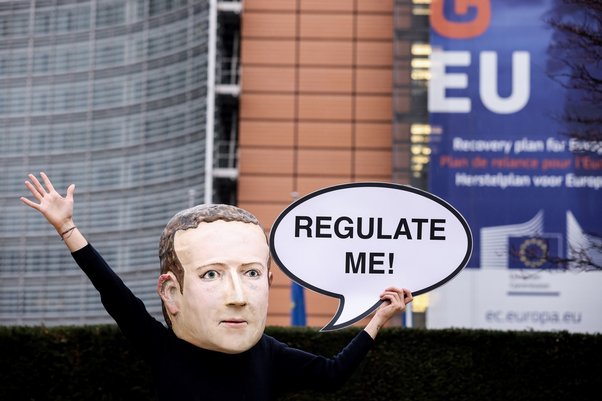Non-partisan social media users in Germany are seeing right-leaning content more than twice as much as left-leaning content in the lead up to the country’s federal elections, a new Global Witness investigation reveals
At a time when Big Tech companies are increasingly under scrutiny for their influence on major elections, investigators studied what content TikTok, X and Instagram's algorithms were recommending to politically interested yet non-partisan users during the election build up.
The investigation further reveals that on TikTok, 78% of political content recommended by the algorithm from accounts the users did not follow was supportive of the far-right Alternative für Deutschland (AfD) party, which currently trails the leading Conservative Christian Democrats (CDU) in polls at around 20% overall. On X, 64% of such recommended political content was supportive of the AfD.
The results follow previous investigations into the US, Irish and Romanian elections. Global Witness said the findings call into question whether social media platforms are taking necessary steps to protect the integrity of the German election.
Ellen Judson, Senior Campaigner – Digital Threats at Global Witness, said:
“X and TikTok are already under investigation by the European Commission for potential failure to minimise risks of undue influence or manipulation in democratic elections. This evidence of political bias in their recommendation algorithm raises further questions about their public commitments to election integrity.
“For years, civil society, the EU and social media platforms worked to develop the Digital Services Act to legally enshrine online platforms’ responsibilities to manage systemic risks from their services to democratic societies. It is of the utmost importance to ensure that these laws are enforced.”
Social media platforms criticised ahead of major elections
News of foreign interference campaigns leading to the Romanian election being annulled late last year put TikTok under the spotlight, while recent reports from Germany have highlighted a dramatic surge of disinformation on X, likely stemming from a Russian influence network.
Furthermore, recent political actions from Big Tech CEOs have attracted attention. The most high-profile interventions have come from X’s CEO Elon Musk, who last year campaigned on behalf of US President Donald Trump.
Ahead of the German election, Musk has come out in support of the AfD, held a conversation with its leading candidate Alice Weidel on X and spoke at an AfD campaigning event.
Following heightened scrutiny, platforms for the first time underwent a "stress test" together with Germany’s Digital Services Coordinator. This simulation is a voluntary provision under the EU’s Digital Services Act, which regulates the largest online platforms active in the EU, to ensure platforms adhere to its requirements during moments of particular high risk, such as national elections.
Investigating algorithmic bias
Ahead of the federal election in Germany, investigators from Global Witness conducted a series of tests by creating three fresh social media accounts each on TikTok, X and Instagram and engaging equally with official party content from the four major parties, CDU, AfD, the Social Democratic Party (SPD) and the Greens, and their respective leading candidates, Friedrich Merz, Alice Weidel, Olaf Scholz and Robert Habeck.
After this initial seeding of the accounts to signal a non-partisan interest in German politics, investigators surfed the algorithmically curated For You pages for 15 minutes at a time. All content that was recommended by the platforms was analysed with regards to its political leanings.
The tests were conducted from Berlin using German phone numbers and profile information.
AfD favoured by the algorithms of X and TikTok?
For You pages are social media platforms’ curated feeds, where their algorithms pick content specifically tailored to a user’s interests. The metrics for this curation are kept under wraps, making it near impossible for independent investigators to ascertain exactly why a certain piece of content is being shown.
A key function of these algorithmically curated feeds is to identify new content from accounts a user has not already followed or engaged with in an effort to keep the user’s engagement. Looking only at these posts, investigators found that the AfD consistently dominated the political content pushed by X and TikTok’s algorithms.
- On TikTok, 78% of such recommended political content was supportive of AfD.
- On X, 64% of such recommended political content from was supportive of AfD.
We wrote to X and TikTok to give them the opportunity to comment on the investigation’s results and analysis. X did not respond. TikTok said the methodology did not reflect the experience of other accounts that interact with a variety of topics.
The company said the For You feed is intended to be unique to each user and suggested other factors that influence what content a user sees, as described on their website.
TikTok did not explain why we received similar results across multiple tests apart from confirming that the actions we took have an influence on the For You feed recommendations.
They said they have shown a strong commitment to election integrity in Germany, providing a resource for reliable information on the app, and removing harmful content among other measures aimed at strengthening the platform.
TikTok also said the platform does not favour any particular political candidate or party, which we do not dispute. We do not allege that TikTok deliberately preference AfD content over that of other political parties; our point is that their algorithms nevertheless produce such a result.
This investigation follows a similar investigation into TikTok’s algorithmic recommendations ahead of the annulled Romanian presidential election in December, in which Global Witness investigators were recommended between 4.6 and 14 times as many posts supportive of right-wing candidate Călin Georgescu as his opponent.
Earlier last year, Global Witness investigators also identified what appeared to be a coordinated astroturfing campaign on X creating the impression of grassroots support for the Azerbaijan government’s presidency of COP.
/
ENDS
Notes to editors:
Methodology:
For each of the three platforms, X, TikTok and Instagram, we set up three new accounts from Germany. We did this on a computer for X and Instagram and on a phone for TikTok. The computer browser was cleared of any cookies and history before each test, and the phone was reset to factory settings before each test.
Each account showed an interest in German politics, with as far as possible an equal interest in all the four biggest political parties. We did this by having all of the nine accounts:
- Click "follow" on the four biggest political parties (CDU, SPD, AfD, the Greens) and their leaders’ accounts (Scholz, Merz, Weidel, Habeck)
- Click on the top five posts from each account. If the posts were videos, we watched for at least 30 seconds. If the post was a thread or contained multiple images, we scrolled through all the contents.
We then went to the algorithmically curated ‘For You’ feed. We spent 15 minutes per platform for each of the three test accounts watching the content we were shown. Whenever we were shown content relevant to the German elections, we interacted with it. If the post was a thread, we scrolled through all of it. If it was a video, we watched it for at least 30 seconds.
We manually classified the content we were shown according to:
- Whether the post came from one of the eight accounts we followed
- Whether the post supported or opposed a German political party
- Whether the post was left-leaning or right-leaning
- Whether the post was an advert
We use the term “party political” content to describe posts that express support for a German political party.
We use the term “left-leaning” to describe posts from the SPD, the Greens or the Left party, posts supportive of or featuring a left-leaning politician, and posts that are not party political but support left-leaning ideas, from centre-left to far-left. This included a small number of posts shown about non-German politics (principally US politics).
We use the term “right-leaning” to describe posts from the CDU, CSU, FDP, AfD, posts supportive of or featuring a right-leaning politician, and posts that are not party political but support right-leaning ideas, from centre-right to far-right. This included a small number of posts shown about non-German politics (principally US politics).


